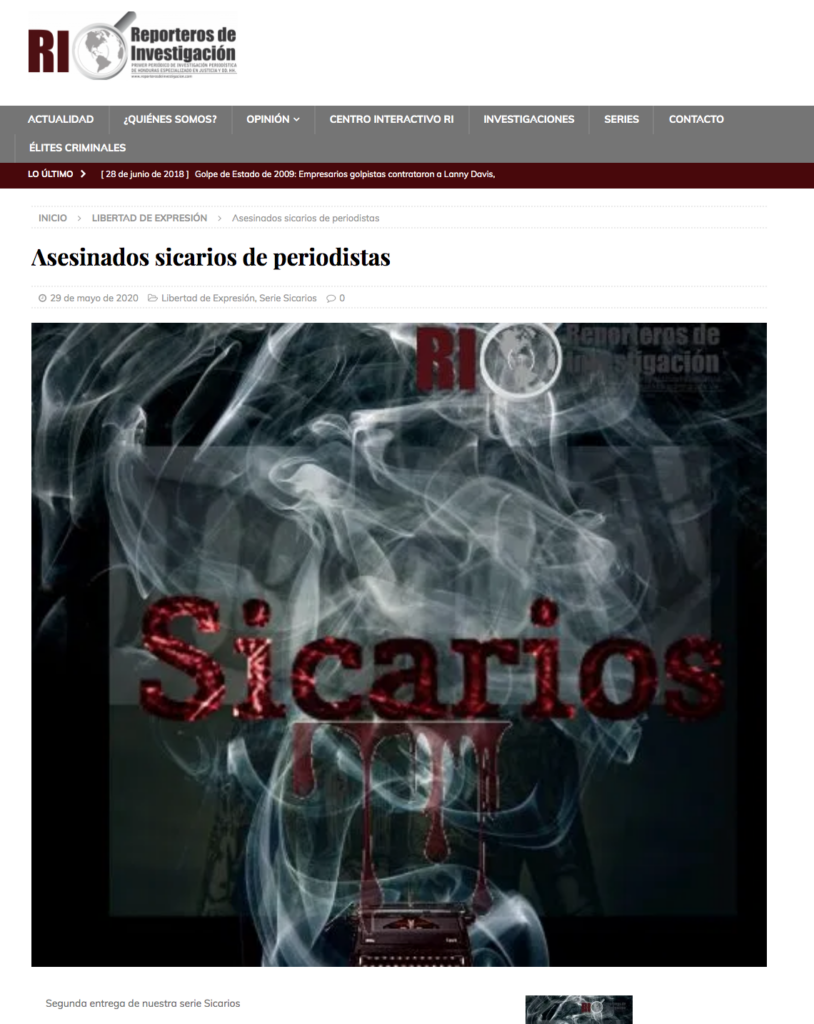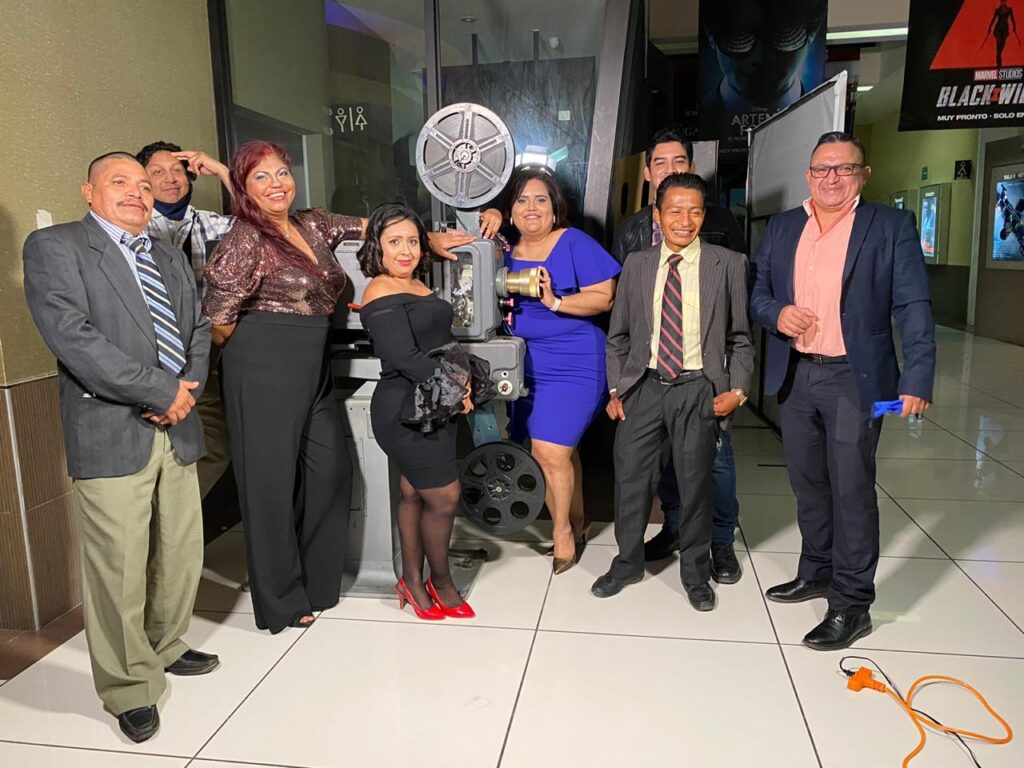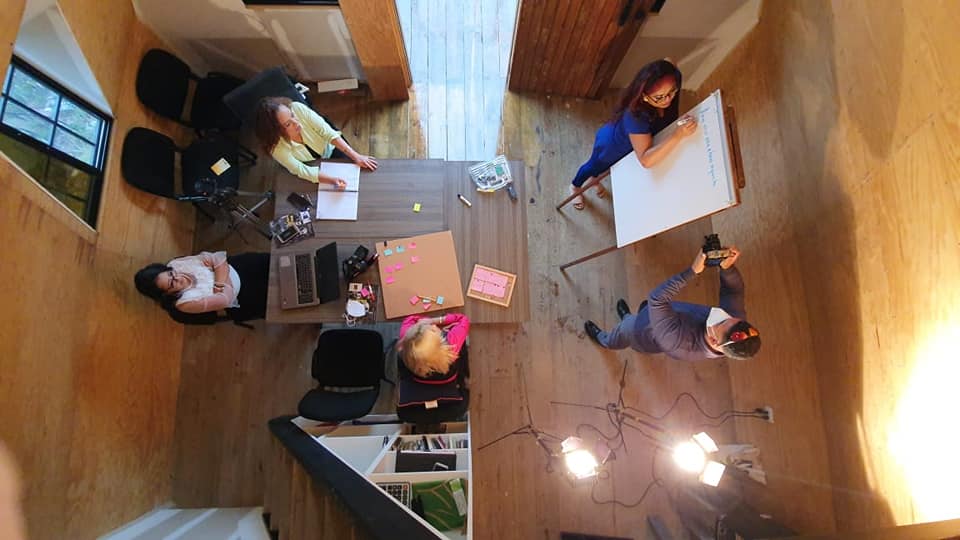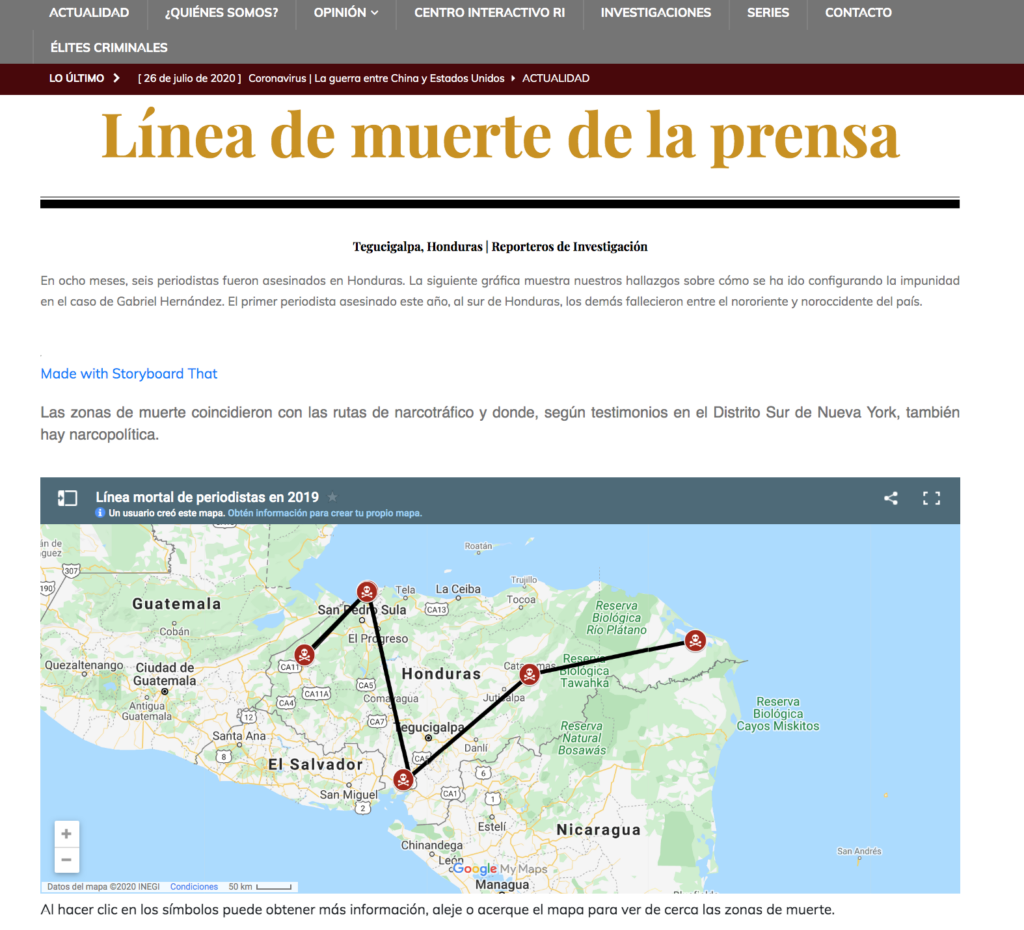When Honduran journalist Gabriel Hernández was killed on March 17, 2019, the Reporteros de Investigación (Investigative Reporters) team knew it should investigate the case. Hernández was walking toward his home in the municipality of Nacaóme, Valle department, when someone shot him six times.
The 54-year-old communicator worked for the channel Valle TV and was the director and presenter of the program “El Pueblo Habla” (The People Speak) where he openly criticized the mayor and the deputies of the department. In 2015, he received threats and attacks from the police, but when he requested protection measures, they were denied. "Does not qualify," was the official response, the site said. This was denied by a representative of the General System of Protection, who told LatAm Journalism Review (LJR) via email that the system had no knowledge of threats against the reporter nor of requests for protection.

Captura de pantalla de la serie Sicarios.
The investigation of his murder, which was added to that of a second journalist, Edgar Joel Aguilar, on Aug. 31, 2019, led Reporteros de Investigación to publish different series. The most recent is Sicarios, in which it follows high-impact crimes against journalists and others.
"In reality, the series Sicarios talks about how there are elites that are in collusion with organized crime in the country to murder journalists and important actors in the country," explained Wendy Funes, director and founder of Reporteros de Investigación de Honduras, in the documentary Élites Criminales (Criminal Elites). "The surprising thing about this is that maras, gangs and also some armed groups from the state are used."
The documentary, which shows the main findings of Sicarios, as well as the work of the journalistic site Reporteros de Investigación in general, was released in a movie theater in Tegucigalpa on the night of Dec. 8. It’s now available on YouTube. The project is part of a longer-term one to make short films that reflect the danger journalists face in Honduras.
Investigating the murders and other dangers journalists face in the country has been a central part of the work of Reporteros de Investigación since it was created in 2017, Funes explained to LatAm Journalism Review (LJR) *.
“We want to follow up on this [murders of journalists] because in reality what we believe is that as long as we do not investigate, no one else will investigate: neither the police nor the prosecution, nobody cares. If the press doesn’t investigate, no one else will,” Funes said.
Her statement is not far from reality. Killing journalists in Honduras seems to not have consequences. In the last decade, more than 80 journalists have been murdered and according to the National Commissioner for Human Rights in Honduras (CONADEH, for its acronym in Spanish), 97 percent of these remain unpunished.
Much of that impunity has to do with the intellectual authors never being prosecuted. Based on leaked documents, the Sicarios series said “that there is a market of hitmen financed by elites in the country,” according to Funes, who added that this is not only seen in crimes against journalists but also against leaders like Berta Cáceres, an indigenous human rights defender, in whose crime businessmen were involved, according to the criminal investigation of the case. However, "there is no punishment for them," Funes said.
"The clearest criminal signature of the lineage of politicians who are feeding the hitmen is distinguished in the crime against journalist Aníbal Barrow," says part of the first installment of the Sicarios series. “Five years after former head of criminal investigation Carlos José Zavala Velásquez found the bodies of the journalist and his driver, decapitated, burned and dismembered, he testified before the Southern District Court of New York that 'rumors were running that Barrow had been assassinated by order of highly ranked corrupt politicians.’ The evidence lies in file 1: 2015-cr-00174-439818 of that court. The officer identified [criminal organization] Los Cachiros as those responsible for Barrow's death. ‘However, he was reassigned and, therefore, could not follow up.’ his defense said before the Court.”

Reporteros de Investigación team
According to the Sicarios investigation, in the Barrow crime that occurred in 2013, only members of the ‘maras’ were convicted despite the fact that they claimed in court to have worked with some politicians. Irregularities like this were also found in the Hernández murder, where according to some documents, the Police allegedly omitted testimonies that involved politicians in the area.
So far, according to Funes, not a single mastermind in a crime against journalists in the country has been convicted. That is why she is convinced that the little justice that can be achieved is through investigative journalism.
“I do believe that at this moment only we who investigate what is happening can save us. Just as colleagues did with the murders of journalists and the El Comercio team [in Ecuador],” Funes said. “We live in a region marked by impunity. More than 30 years have passed, for example, since one of the most symbolic murders in Latin America, which is the case of Guillermo Cano [Colombia], and it is still not clear what happened to him. […] So I believe that only the work of the press can guarantee a bit of the right to the truth that relatives and society in general have.”
Obstacles for journalism in Honduras go beyond the lethal
As its name indicates, Reporteros de Investigación is dedicated to conducting journalistic investigations and promoting that type of journalism. However, something that characterizes the team of five permanent journalists and almost 12 contractors is the emphasis on investigating crimes against journalists and in general everything that affects the exercise of press freedom.
Journalistic work in Honduras faces other obstacles besides assassinations. In the series ‘Cárcel para la palabra‘ (Jail for the Word), for example, the team reports on a growing trend in the country, which consists of suing journalists for various crimes of defamation in such a way that they can be sent to prison.
"They learned from having taken David Romero to prison that it was more effective to accuse journalists for 30 crimes of defamation, for 100 crimes of defamation," Funes explained. “There is a journalist at the moment, Milton Benítez, who is accused of 30 defamation crimes. And if these penalties are combined, as they did with David Romero, he will go to prison.”
Romero was serving a 10-year prison sentence for crimes against honor and crimes of defamation constituting injurias, according to C-Libre. He died on July 18 of this year from COVID-19 after being hospitalized for 13 days.
In addition to this trend of complaints, there is also the disinformation that according to Funes is fostered by the government itself to discredit the press. Due to this environment, journalists have trouble covering a topic, they are harassed, insulted both physically and online.

Durante la producción del documental Élites Criminales. (Foto: Cortesía/ Dunia Orellana)
"In the series ‘Cárcel para la palabra’ we talk about all the risks of being a journalist and how we can expose ourselves to prison as journalists," Funes explained. “There we tell, for example, that there are exiled journalists, that there was a jailed journalist, who was David Romero, and that there are now 20 more accused. Also in the same series is the issue of disinformation.”
Reporteros de Investigación has felt these obstacles firsthand. A journalist from the team suffered a series of robberies in 2018, and in 2019 the site was the victim of cyberattacks, blocks to its Facebook page and even smear campaigns. For example, they tried to link the site with the ‘maras,’ a fact it reported to the Protection Mechanism, according to Funes.
Given the journalistic investigations published by the site, the authorities have the strategy of ignoring them, according to Funes, "as if we did not exist."
“I think it is good to make it visible, because as I said, its strategy is to make us invisible, and for our message to not reach the population. And to denounce that there really is an operation of drug traffickers who are involved in politics, and yes, I am not afraid to say so,” Funes said. “Here the drug traffickers are involved in politics and they have also been murdering journalists. And we did not know that until now that we are going to the zones, and that people talk about it.”
The situation of the press in Honduras has also been highlighted by the IACHR's Office of the Special Rapporteur for Freedom of Expression. In 2019, it publicly urged the State to investigate the crimes of Hernándezand José Arita, although in its annual report of that year it indicated that at least 6 journalists were murdered in the country that year in relation to their work and added that “their material and intellectual authors have not yet been identified.” The Office of the Special Rapporteur also highlighted the large number of exiled journalists as well as the case of David Romero, who also had precautionary measures from the IACHR, and reiterated its call for the State to decriminalize so-called crimes against honor.

However, for Funes, the support from other media as well as from the international community is not enough for the level of violence experienced by journalists in the country. For that reason, she asks for other colleagues to join the investigations.
“The murders [of journalists] have continued [in the country]. Last year we closed with 80 [in the last decade] and this year there are organizations that speak of 85. So the murders continue, but it seems that nothing will happen. In other words, people do not perceive it, at an international level there is not much of an echo,” Funes said. "Sometimes I feel like no one cares about Honduras, that we are alone, that we are screaming in the desert."
For now, the commitment of Reporteros, as Funes said at the opening of the documentary, is "to open the eyes of the majority." "We are committed from Reporteros to doing a different kind of journalism for this country."
LJR asked the National Police and public prosecutor for comments, but did not receive a reply as of publication.
*LJR spoke with Wendy Funes on two occasions, the first in December 2019 and the second in the beginning of December 2020.
This story was originally written in Spanish and translated by Teresa Mioli.